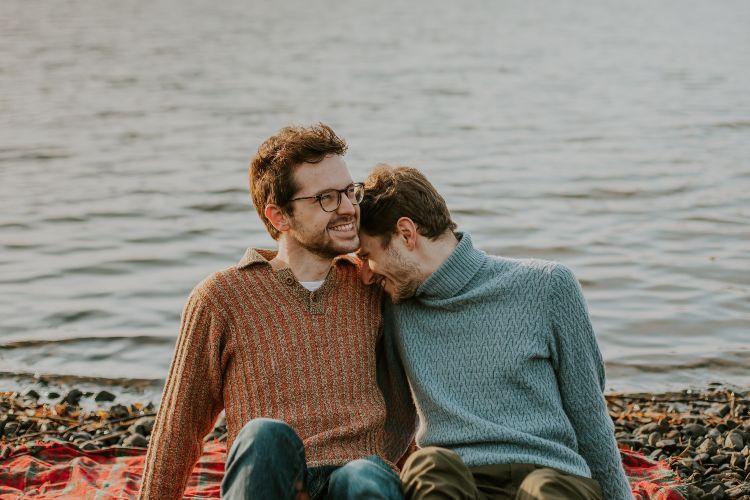How to Express Romantic Love: Effective and Heartfelt Gestures
All the world celebrates romantic love, and people from all walks of life look for ordinary moments and extraordinary ones to express love to their...
3 min read
![]() Williamsburg Therapy Group
:
Mar 10, 2021 9:00:00 AM
Williamsburg Therapy Group
:
Mar 10, 2021 9:00:00 AM

If you’re among the 4.5% of Americans who identify as LGBTQ+, it’s important that you feel accepted and secure when heading to therapy. It’s important that you understand, research, and book appointments with LGBTQ+ friendly therapists to get the care that they need. This can go a long way in making you feel safe and comfortable in your sessions.
Here, we’re going to talk about how those in the LGBT+ community can find therapists who work for their specific needs. Read on for some ideas on how to find a mental health professional who will both accept and assist you.
The Unique Needs of LGBTQ+ Patients
LGBTQ+ people struggle with mental health at much higher rates than their Cishet counterparts do. They are twice as likely to experience suicidal thoughts. A recent study from 2017 found that 60% of queer youth also have reported feeling sad and hopeless to the point that they stopped doing some of their usual activities.
These feelings can stem from multiple factors, but mental health professionals and survey takers note that strong family bonds, caring professionals, and safe spaces can reduce the risk of depression in queer people. Feeling accepted at therapy is a large part of this.
When you see a mental health professional, you need to feel comfortable discussing topics that pertain to gender and sexuality. You also need to feel at ease when discussing other hard subjects and are unlikely to feel comfortable in an unaccepting environment or one that, while accepting, does not understand the LGBTQ+ community.
Queer people also experience profound discrimination as a result of who they are. This is immensely painful, and therapists who are familiar with LGBTQ+ issues are more likely to be sensitive to this pain. Getting a therapist who has a foot in the door of the queer community means that you’ll be less likely to need to explain the basics of traumatic experiences stemming from discrimination. You can get into the important parts of your session more quickly.
How to Find LGBTQ+ Friendly Therapists
So, how can you find a therapist for LGBTQ+ people?
The first thing you’ll need to do is consider whether you want individual therapy, group sessions, couple’s therapy, or simply medication management for anxiety/depression. All of these are viable options that benefit from working with a queer-friendly therapist.
Once that’s decided, you’ll need to browse therapists in your area. If you’re unsure of where to begin, you can start by Googling ’therapists near me’ or ’LGBT therapists near me.’
Find an LGBTQ+ friendly therapist is a lot like searching for mental health professionals in general. Some of the things that you need to consider include:
Make sure that you ask questions when you’re unsure about any of these points.
What to Look for in a Therapist
Now that you know the logistics of how to find a therapist, you’ll need to consider what to look for in a therapist. After all, there are hundreds of qualified therapists who accept your insurance and have great online reviews. You’ll need to dig deeper than the practical level to find the right one for your needs.
Many LGBTQ+ people feel more comfortable when speaking with another queer person, so you may want to look at therapists who are also in the community. Browse expert therapists and comb through their web profiles until you find a person who talks about LGBTQ+-affirmative therapy or implies that they have a same-sex partner.
This is a great way to ensure that you get a therapist who already understands both the best and worst parts of being LGBTQ+.
If you aren’t emotionally invested in this, try to find someone (LGBTQ+ or not) whose web profile says that they specialize in LGBTQ+ issues. Even if your therapy visits have nothing to do with your queerness, knowing that your therapist cares about these issues can make you feel more comfortable.
You also should talk to other queer people that you know and see which therapists they go to. Ask them questions about their therapists to find one that sounds right for you. You can ask your friends if their therapist makes them feel safe and comfortable being who they are.
Finally, see if other LGBTQ+ people online have endorsed the therapist. Check out social media groups for queer people that you likely are already in. Look at reviews of people who have in some way indicated that they’re part of the community. This will give you a better picture of whether or not your chosen therapist is LGBTQ+-friendly.
Begin Your Journey Toward Better Mental Health
While there are many ways that you can boost your mental health, finding a therapist that works with all gender and sexual identities is the first step.
Book an appointment with our LGBTQ+ friendly therapists today. Our Psychologists and Psychiatrists are happy to help you work towards becoming the best version of yourself by giving you the tools that you need to reduce stress and anxiety. We look forward to placing you on the path to self-acceptance and self-love.

All the world celebrates romantic love, and people from all walks of life look for ordinary moments and extraordinary ones to express love to their...

What is relationship burnout or relationship fatigue? Many of us have heard of burnout, but we often connect it to professional life and the problems...

In today's digital age, so many of us are locked into our mobile devices each and every day, which can have a negative impact on our mental...